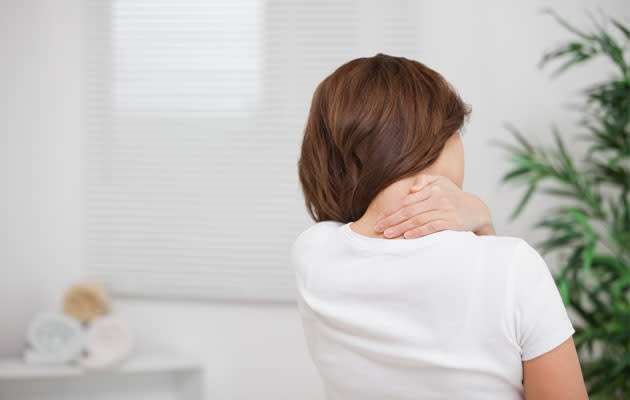 Fit to Post Health
Fit to Post HealthIs your back pain due to a slipped disc?

Do not ignore that persistent neck pain, or the pain that travels up and down one or both arms. Nor should you neglect that lingering lower back pain that radiates to the legs and buttocks. These are all warning signs of a possible slipped disc, also known as herniated disc.
“While normal muscle ache tends to be localised in the injured muscle, pain from a slipped disc tends to radiate to the shoulders, arms or legs, depending on which part of the spine is affected,” says Dr Guo Chang Ming, Senior Consultant, Department of Orthopaedic Surgery, Singapore General Hospital (SGH).
When a slipped disc pinches a nerve or presses on the spinal cord, the pain is accompanied by numbness, a tingling sensation and muscle weakness. These symptoms may impair limb coordination or the ability to lift and carry objects, adds Dr Guo.
Related article: Often spend hours straight in front of a computer? Find out how you can protect your spine
What is a slipped disc?
The human spine is made up of 24 bones called vertebrae. In between each vertebra is a small, spongy disc which acts as the spine’s cushion or shock absorber. These discs keep the spine flexible.
A slipped disc or herniated disc occurs when the disc’s outer layer cracks or ruptures, exposing the inner soft, jelly-like substance which now protrudes out. In attempting to heal the crack, the body may turn the slipped disc into a fibrous scar tissue known as bone spur.
A slipped disc can happen anywhere along the spine, but it usually affects the lower back (lumbar spine) and sometimes, the neck (cervical spine).
What causes a slipped disc?
As the spinal discs lose their elasticity due to ageing, they become more prone to tearing. Any action that exerts too much pressure on the spine, such as lifting heavy objects, may lead to one or more slipped discs.
Symptoms of a slipped disc
Mild to sharp pain in the neck, shoulders or lower back
Numbness, tingling or weakness in one arm or hand (slipped disc in the neck)
Numbness, tingling or weakness in the legs, feet or buttocks (slipped disc in the back)
Shooting pain when sneezing or coughing
Loss of bladder or bowel control
Related article: Doctor’s tips to prevent back pain
Treatment for a slipped disc
A slipped disc will usually heal by itself within four to six weeks. Avoid bending, lifting and prolonged sitting during this period.
If the slipped disc causes severe back pain, take one to two days of strict bed rest, lying on a firm surface or mattress. You can resume light physical activity thereafter to keep your spine flexible.
To relieve your symptoms, your doctor will recommend pain relief and anti-inflammation medications, muscle relaxants and physical therapy.
One out of 10 cases of slipped disc will require surgery.
“When slipped discs and bone spurs occur in the cervical spine or neck area, the nerves and spinal cord can be affected. In extreme cases, if left untreated, paralysis can occur,” says Dr Guo.
“This is because the spinal cord relays messages to and from the brain to other parts of the body, much like a computer cable. If this cable is damaged, the computer or brain is able to function but none of the peripherals can work properly,” he explains.
If you have difficulty walking or standing, or experience progressive muscle weakness and bladder and bowel dysfunction, surgery is recommended to prevent permanent damage.
Tips to prevent a slipped disc
Maintain a healthy weight to reduce pressure on the discs in the back
Exercise moderately and regularly (e.g. brisk walking and swimming)
Keep a good posture when sitting or standing
Lift heavy objects the right way (use your legs, not your back to lift – bend your knees, squat and lift)
You should seek medical attention for any neck pain or back ache that limits your movements, causes numbness, tingling and muscle weakness, or loss of bladder and bowel control.
“It is important to find the root cause of such problems. Massages and medications provide only temporary pain relief. The condition may deteriorate if left untreated,” says Dr Guo.
For Nurses’ Day: Always wanted to thank a SingHealth nurse? Here’s your chance to leave a note online
Do you experience sharp pains in your back or have numbness or tingling sensations in your arm or leg? You could have a spine problem. Ask our expert any question you may have about spine problems – it’s free!
This article was written by Teresa Cheong for Health Xchange, with expert input from the Department of Orthopaedic Surgery, Singapore General Hospital (SGH).
For more health tips, visit HealthXchange.com.sg and sign up for our FREE e-newsletter.
Health Xchange's articles are meant for informational purposes only and cannot replace professional surgical, medical or health advice, examination, diagnosis, or treatment.


